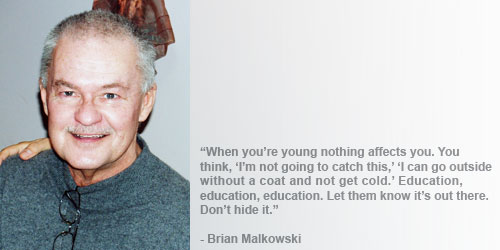
Brian Malkowski, age 67, is a retired teacher who has volunteered at AIDS Partnership Michigan for more than 20 years.
1) What different roles have you played?
Mainly the hotline but over the years I've done a number of things. They used to have the buddy program. They no longer have it but they had it for a while. You'd get paired up with someone who's HIV-positive and you'd work to make sure they were doing things, get out, take in a movie, just spend time with them so they would know they're not alone, not shunned or anything. I did that for a number of years. Now it's mainly phones. We get calls you wouldn't believe. Sometimes it's prank calls, but it's usually serious calls.
2) What kind of help do people need when they call?
Generally they want to find out where to get testing. But then you start talking and they say, 'This is what happened, am I in danger, what do you think?' Very often there's no reason to go get tested. Sometimes someone was just touched by an HIV-positive person. Sometimes people just want to talk – they call when they know I'm there. They need a release, someone to talk to that's not going to judge.
APM has wonderful people to call when you need help. Even if it's just talking. We direct them to testing and counseling and we work with people who have HIV. There are groups that you can associate with. We have programs to help them get food, lodging and that type of thing. And we give directions to other places; there are excellent groups in metro Detroit that we work with. The best thing is they can be with people who don't judge them or shun them.
3) Why have you volunteered for APM for so long?
I knew nothing about this 20 years ago, and a friend of mine from college was sick and I went to see him at the hospital and he had tubes everywhere and the (hospital staff) said not to go by him. In two weeks he was dead. It was HIV.
I looked it up, I didn't know much about it, started studying it and called APM. I just thought, Oh, I can help out somehow.
And I liked it. There's wonderful people down there. I've been retired 17 years now, and I have time. I just continued it.
4) How has the HIV/AIDS problem improved since you've been volunteering?
Drastically. Pills help and knowledge helps and prevention helps. The information that's out there, it's more positive and the stigma isn't there. Yes, HIV is still out there and people still suffer and die, but you can at least lead a normal life if you take care of yourself and see the right doctors.
5) What's the most effective thing to do to stop the spread of AIDS?
Education. Knowledge. And you have to start young. When you're young nothing affects you. You think, 'I'm not going to catch this,' 'I can go outside without a coat and not get cold.' Education, education, education. Let them know it's out there. Don't hide it. Don't say 'I don't want to talk about it, because my kid's not like that.' You don't know what your kids are doing. Kids don't tell mom and dad everything. And sometimes they're getting information from their friends that's not true. So make sure the information is there.










